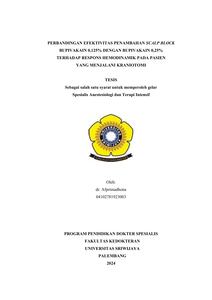AFPRIMADHONA, AFRIMADHONA and Mafiana, Rose and Irwanto, Fredi Heru (2024) PERBANDINGAN EFEKTIVITAS PENAMBAHAN SCALP BLOCK BUPIVAKAIN 0,125% DENGAN BUPIVAKAIN 0,25% TERHADAP RESPONS HEMODINAMIK PADA PASIEN YANG MENJALANI KRANIOTOMI. Masters thesis, Sriwijaya University.
![[thumbnail of RAMA_11706_04102781923003_cover.jpg]](http://repository.unsri.ac.id/159713/1.hassmallThumbnailVersion/RAMA_11706_04102781923003_cover.jpg)  Preview |
Image
RAMA_11706_04102781923003_cover.jpg - Accepted Version Available under License Creative Commons Public Domain Dedication. Download (311kB) | Preview |
|
Text
RAMA_11706_04102781923003.pdf - Accepted Version Restricted to Repository staff only Available under License Creative Commons Public Domain Dedication. Download (6MB) | Request a copy |
|
|
Text
RAMA_11706_04102781923003_TURNITIN.pdf - Accepted Version Restricted to Repository staff only Available under License Creative Commons Public Domain Dedication. Download (11MB) | Request a copy |
|
|
Text
RAMA_11706_04102781923003_8866920016_8829820016_01_front_ref.pdf - Accepted Version Available under License Creative Commons Public Domain Dedication. Download (1MB) |
|
|
Text
RAMA_11706_04102781923003_8866920016_8829820016_02.pdf - Accepted Version Restricted to Repository staff only Available under License Creative Commons Public Domain Dedication. Download (782kB) | Request a copy |
|
|
Text
RAMA_11706_04102781923003_8866920016_8829820016_03.pdf - Accepted Version Restricted to Repository staff only Available under License Creative Commons Public Domain Dedication. Download (227kB) | Request a copy |
|
|
Text
RAMA_11706_04102781923003_8866920016_8829820016_04.pdf - Accepted Version Restricted to Repository staff only Available under License Creative Commons Public Domain Dedication. Download (340kB) | Request a copy |
|
|
Text
RAMA_11706_04102781923003_8866920016_8829820016_05.pdf - Accepted Version Restricted to Repository staff only Available under License Creative Commons Public Domain Dedication. Download (164kB) | Request a copy |
|
|
Text
RAMA_11706_04102781923003_8866920016_8829820016_06_ref.pdf - Bibliography Restricted to Repository staff only Available under License Creative Commons Public Domain Dedication. Download (101kB) | Request a copy |
|
|
Text
RAMA_11706_04102781923003_8866920016_8829820016_07_lamp.pdf - Accepted Version Restricted to Repository staff only Available under License Creative Commons Public Domain Dedication. Download (3MB) | Request a copy |
Abstract
ABSTRACT Background: Scalp block is one of the regional blocks that can be combined with neuroanesthesia in craniotomy of tumor resection (CTR) surgery. The advantages of scalp block can blunt the stress response during CTR, maintain hemodynamic stability, achieve better postoperative analgesic effects, and reduce the use of anesthetic drugs during the operation. Method: This study is a double-blinded randomized controlled trial. The subjects consisted of 28 samples aged 18-65 years, GCS 15, ASA II-III physical status, with a diagnosis of intracranial tumor who underwent CTR at Mohammad Hoesin Hospital, Palembang. The samples were divided into two treatment groups using general anesthesia techniques with the addition of a scalp block using bupivacaine 0.125% and bupivacaine 0.25%. Patients allergic to bupivacaine, those in hemorrhagic shock, or those undergoing surgery lasting more than 6 hours were excluded from data collection. Data analysis was conducted by assessing hemodynamic changes, namely systolic blood pressure (SBP), diastolic blood pressure (DBP), mean arterial pressure (MAP), and heart rate (HR). The data analysis methods used were the general linear model, specifically repeated measures ANOVA, paired t-test, and independent t-test with SPSS version 28. Results: 28 research samples divided into two groups, there were statistically no significant differences in the hemodynamic changes of systolic blood pressure (SBP), diastolic blood pressure (DBP), mean atrial pressure (MAP), and heart rate (HR) over time between the two groups using buvipakain 0.125% and buvipakain 0.25% with the independent t-test (p>0.05). The presence of significant hemodynamic changes in each treatment group over time with repeated-ANOVA and paired-t-test statistical tests (p<0.05). No side effects were observed. There was no significant proportional difference in the addition of fentanyl doses between the two groups (p>0.05). Conclusion: The addition of a scalp block with 0.125% bupivacaine is equally effective as 0.25% bupivacaine in maintaining hemodynamic stability during tumor resection craniotomy surgery. The need for opioids during the intraoperative period can be reduced. Keywords: scalp block, neuroanesthesia, hemodynamics, CTR.
| Item Type: | Thesis (Masters) |
|---|---|
| Uncontrolled Keywords: | scalp block, neuroanesthesia, hemodynamics, CTR. |
| Subjects: | R Medicine > RD Surgery > RD78.3-87.3 Anesthesiology |
| Divisions: | 04-Faculty of Medicine > 11706-Anestesiology and Reanimation (Sp |
| Depositing User: | Afprimadhona Afprimadhona |
| Date Deposited: | 25 Nov 2024 01:33 |
| Last Modified: | 25 Nov 2024 01:33 |
| URI: | http://repository.unsri.ac.id/id/eprint/159713 |
Actions (login required)
 |
View Item |
